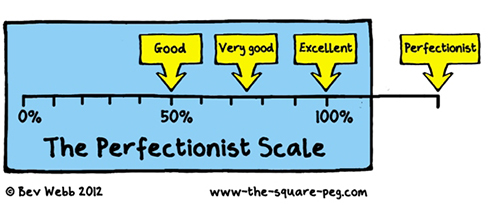
Perfectionism is one of the greatest flaws a person can have, yet many of us don’t realize its negative impact on our lives. Some of us are even proud of it, and wear it like of badge of honor. In reality it’s something to be ashamed of, and can hold us back in just about every area of our lives. I’m no authority on the subject but I am an ex-perfectionist myself. So whether you’re the completionist type or simply can’t stand being wrong–read on!
The “desire to do your best” isn’t perfectionism
Excellence is different than perfectionism. This is something that needs to be stated first and foremost, as they are often confused. Adding those finishing touches and ironing out every mistake is natural and rewarding, whether you’re editing your prose or debugging your code. This is what it means to strive for excellence.
The pursuit of excellence is enjoyable in and of itself. Whereas perfection is always out of reach, excellence has goal posts and markers of progress that motivate–not discourage. And even when your goals aren’t as well-defined as a six-pack, there’s a real feeling of improvement you get every day. That’s what it means to constantly win!
Perfectionism is a sign of immaturity
Children are young perfectionists. When they develop the capacity for it, they quickly become very picky and very petty, and are prone to outbursts when things aren’t perfect. The classic scene is the kid in the toy store, throwing a tantrum because his favorite action figure is a different color than what was on tv. You feel bad for the parents and assume the boy will grow out of it, but one doesn’t escape perfectionism that easily.
The kid grows up and learns to write and suddenly he’s in your comments section on youtube. He’s complaining about some tiny thing the videogame streamer has done wrong. A few years later and his comments are more articulate, yet the crux of it remains the same: he isn’t able to appreciate the entertainment for what it is, and that extends to every aspect of his perfectionist life.
This kid one day becomes a man, but he never makes anything–he doesn’t dare risk creating something that isn’t perfect. He knows the comments he’ll get, so fear consumes him and he’s left bitter and unfullfilled. He is then forced to build his self-esteem around what he consumes rather than what he creates. Don’t be this guy!
Your Ego is in your way
A lot of people think that “having an ego” simply means you’re arrogant. While it’s true that arrogant and prideful people have an ego, folks with the largest egos often have the lowest self-esteem. Insecure about something? That’s an ego problem. Jealous about someone else’s success? That’s an ego problem too. Whether you’re critical of others or just yourself, your ego is the source of it all.
Your ego is your inner critic and if you let it, it will keep you away from the most powerful tool of creation you own.
Your Subconscious Mind / The Holy Spirit
I’m in the thick of writing for Samurai of Hyuga Book 4 these days, and each morning I get up and sit at my desk in a routine ritual. I bring up the chapter I’m working on, re-read what I wrote yesterday, and then a sort of magic takes over. Sentences form up inside my head and I write them down, but I’m not in conscious control of this process any more than my heartbeat.
This is the work of the subconcious mind. Humanity has known about it for centuries, and has given it many different names. The Holy Spirit is certainly one of them–it acts through us and comes from a source that’s greater than we are. It’s an almighty power that fills you, and you don’t need to know how to pray the Rosary to make use of it.
It doesn’t matter what you believe: you just have to put your ego aside.
In the video above, Siri Hustvedt explains the process of writing fiction. She does a terrific job highlighting where our subconscious mind takes over. Her questions tap into the root of creativity: where do our sentences come from, and where do we get those “gut feelings”? Authors know a right sentence from a wrong one, based on nothing but a feel. It’s absolutely crazy!
How to not be a perfectionist
You don’t have to ‘lower your personal standards’ to cure yourself of being a perfectionist. To quiet that inner critic, you just need to reframe your life’s victory conditions. As in, you need to be getting that juicy, positive dopamine feedback hit every day. You need a system that allows for small and constant victories instead of one victory in the distant future.
Once you start constantly winning and your progress becomes a subconcious series of habits, then that critic shuts up fast. You won’t be jealous or insecure anymore. You’ll be less critical of others and their creations, and you’ll be able to enjoy life to its fullest.
So kill that perfectionist, already!


I quite like these insights you wright about every now and then. Whether it’s about writing or not it’s very interesting!
that is true if people don’t put all hard work in to it not living
I do admit i have a lack of self esteem even tough all the girls I work with say I’m good looking and it’s hard to explain because I tell joke laugh or act like a narcissistic asshole whenever I feel vulnerable and I m tired of it thank to what you posted I feel like trying to change thank you and I’m very excited to read book4 whatever choice you made had to do that pun my heart will hurt if I Don’t get my dose of masami-chan this time but the wait will be better I wish you enlightened to reach new heights with this epic story
Interesting post made me think and reevaluate my life. Glad to hear SOH4 is coming along, I absolutely enjoyed the first 3 – very excited!